Language Change Theories in English Language A Level: A Comprehensive... Show more
Sign up to see the contentIt's free!
Access to all documents
Improve your grades
Join milions of students
By signing up you accept Terms of Service and Privacy Policy
Subjects
Responding to change (a2 only)
Infection and response
Homeostasis and response
Energy transfers (a2 only)
Cell biology
Organisms respond to changes in their internal and external environments (a-level only)
Biological molecules
Organisation
Substance exchange
Bioenergetics
Genetic information & variation
Inheritance, variation and evolution
Genetics & ecosystems (a2 only)
Ecology
Cells
Show all topics
Britain & the wider world: 1745 -1901
1l the quest for political stability: germany, 1871-1991
The cold war
Inter-war germany
Medieval period: 1066 -1509
2d religious conflict and the church in england, c1529-c1570
2o democracy and nazism: germany, 1918-1945
1f industrialisation and the people: britain, c1783-1885
1c the tudors: england, 1485-1603
2m wars and welfare: britain in transition, 1906-1957
World war two & the holocaust
2n revolution and dictatorship: russia, 1917-1953
2s the making of modern britain, 1951-2007
World war one
Britain: 1509 -1745
Show all topics

20
0
Lauren Giles
11/12/2025
English Language
Language Change English Language A Level
454
•
11 Dec 2025
•
Lauren Giles
@laurengiles_rfks
Language Change Theories in English Language A Level: A Comprehensive... Show more
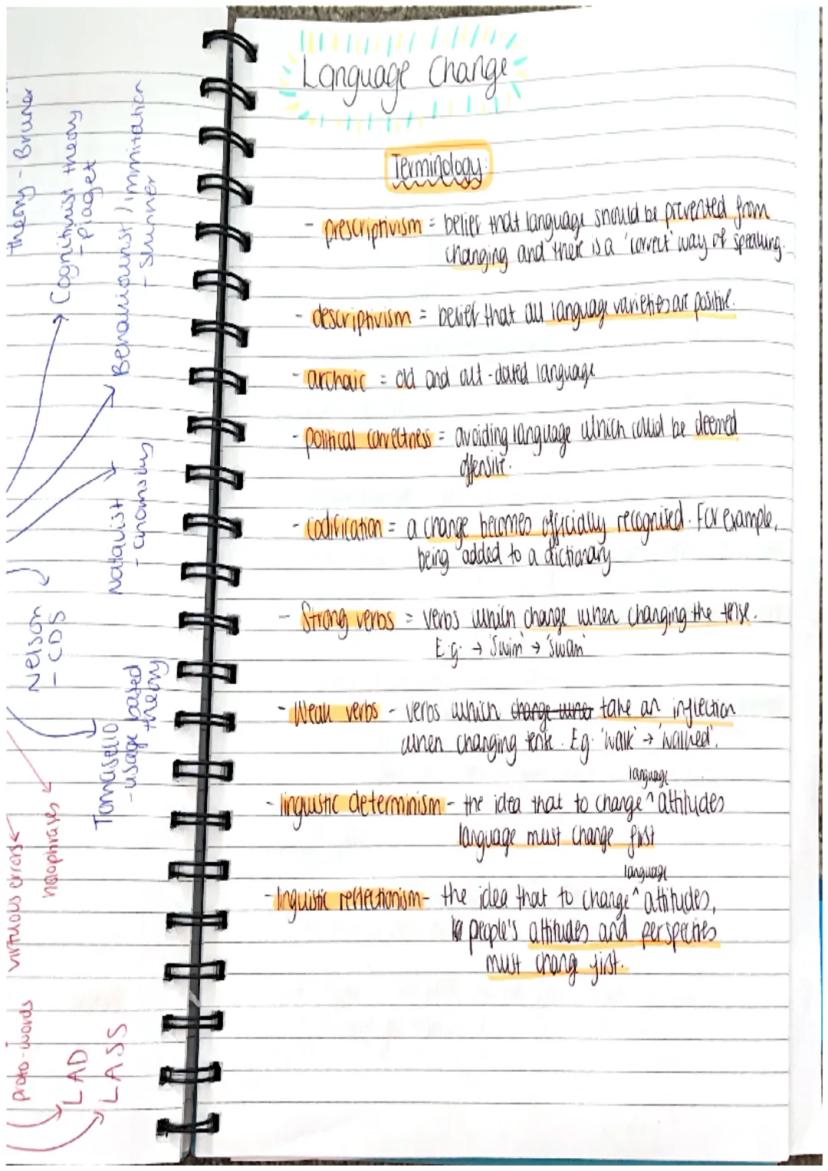
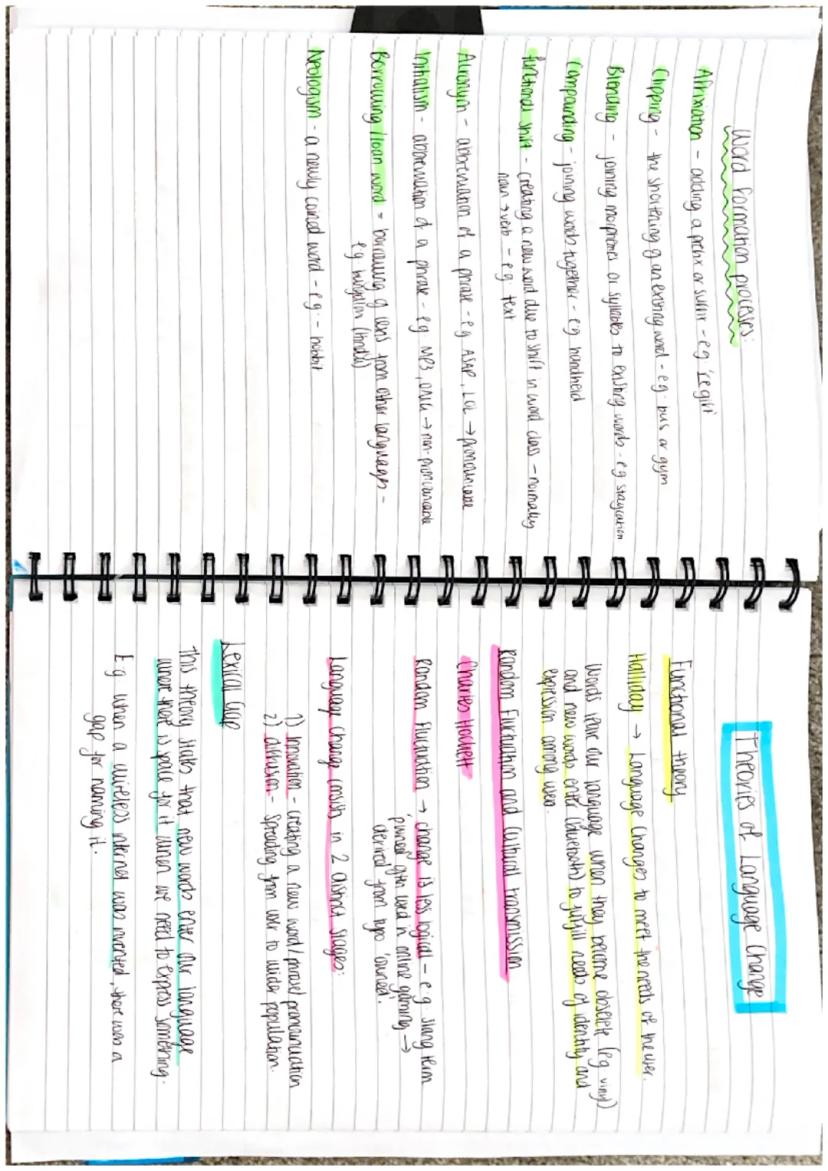
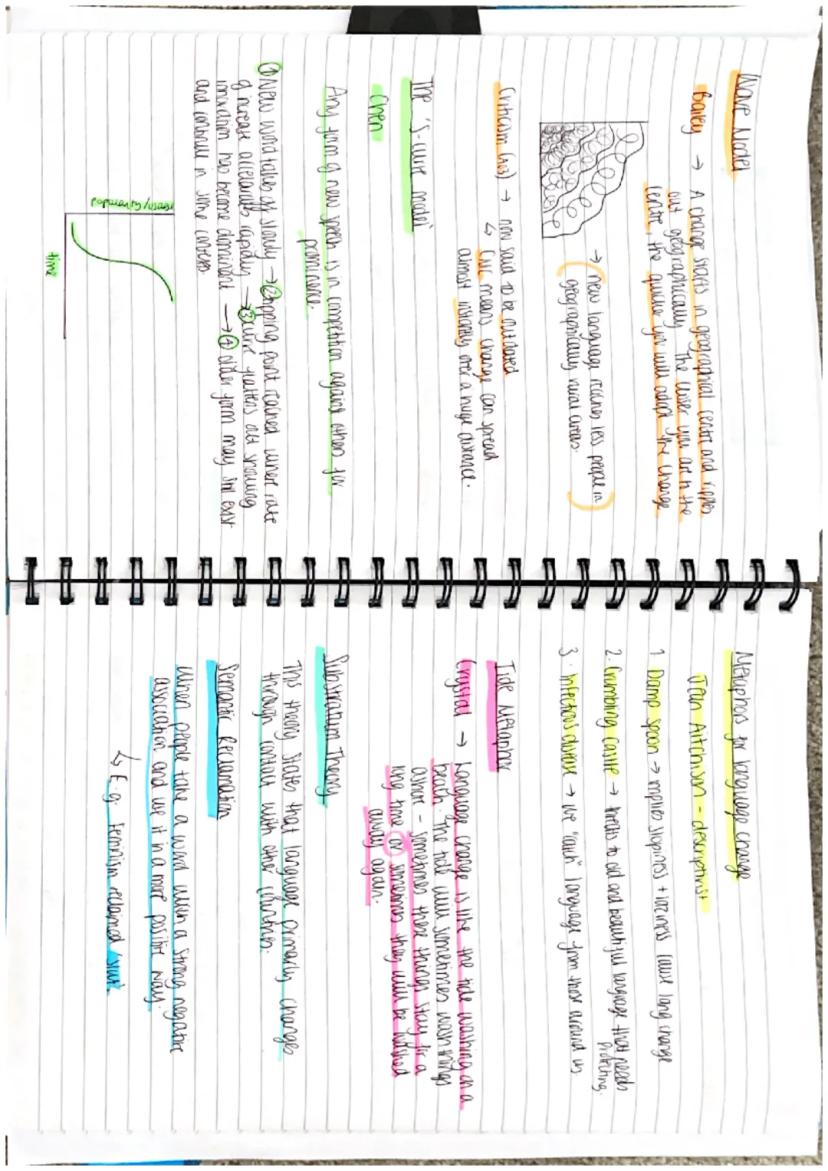
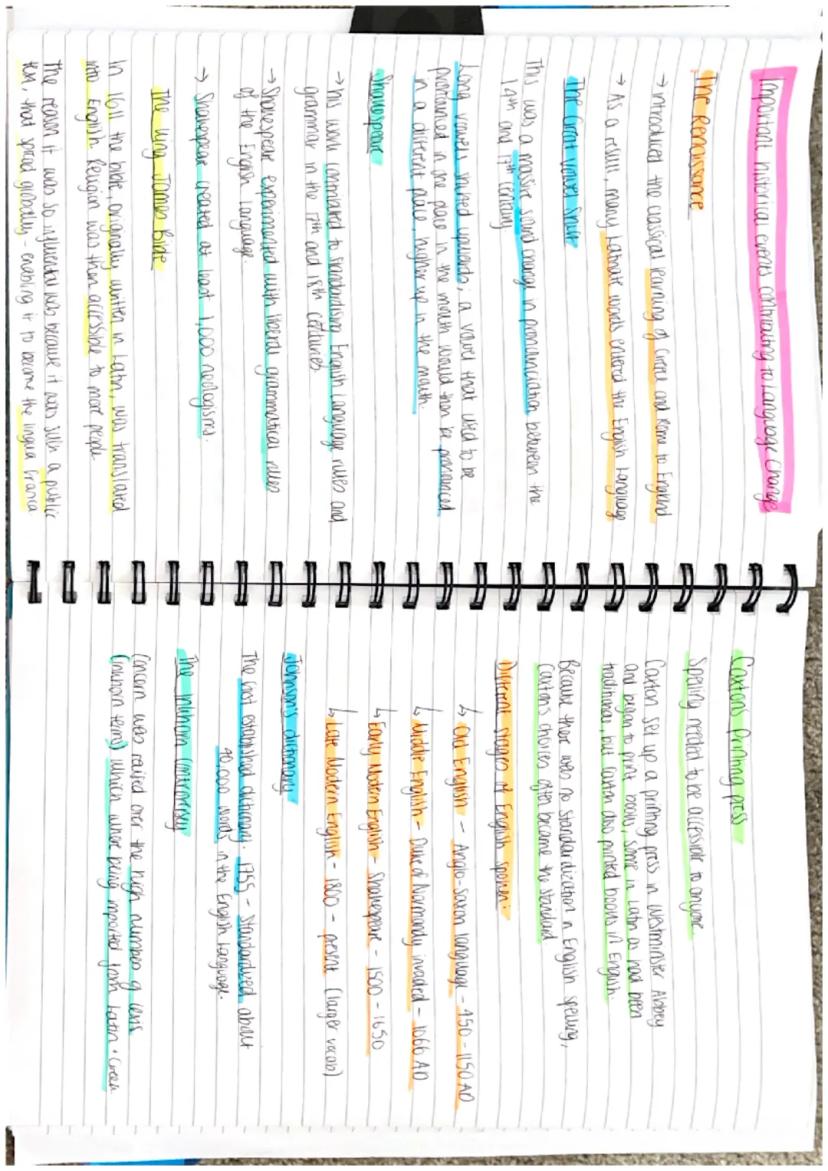
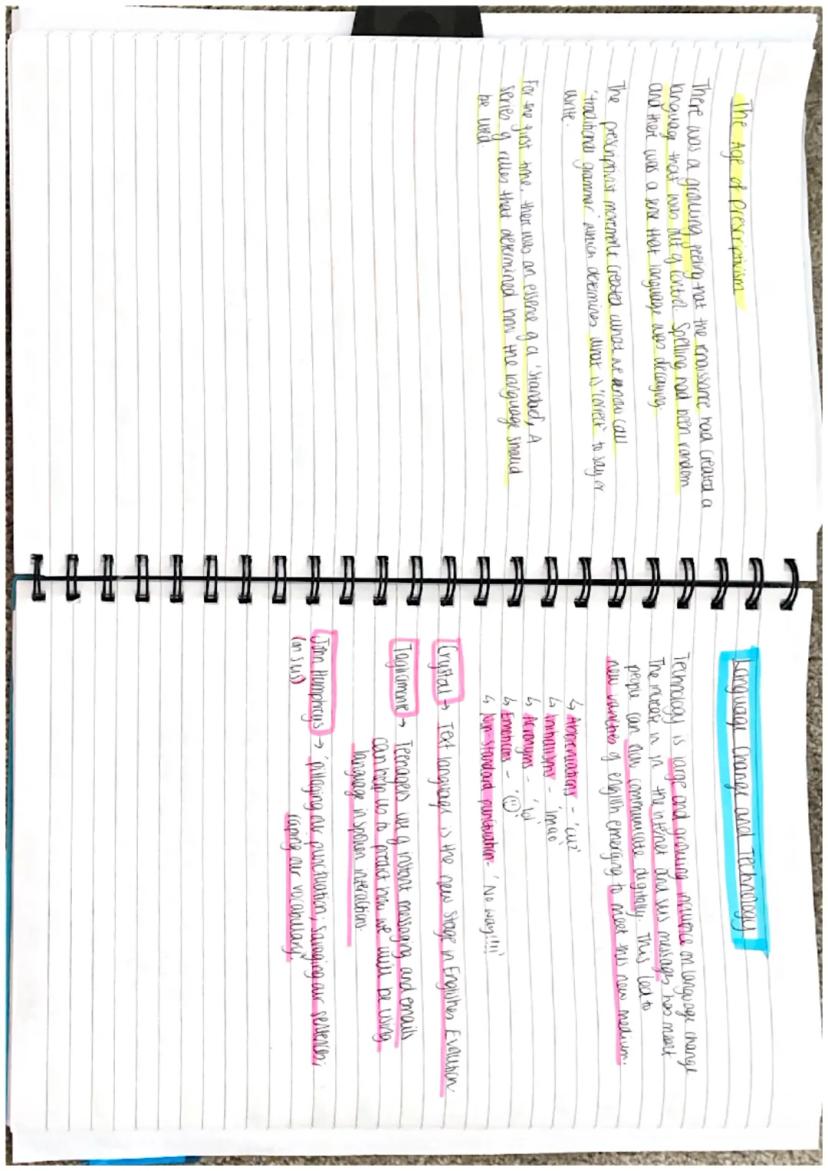

Word Formation Processes and Theories of Language Change
This page delves into various word formation processes in English language A level and introduces key theories of language change.
Word formation processes discussed include:
• Affixation • Clipping • Blending • Compounding • Functional shift • Acronyms and initialisms • Borrowing • Neologisms
Example: 'Staycation' is an example of blending, combining 'stay' and 'vacation'.
The page then introduces theories of language change:
• Halliday's Functional Theory • Charles Hockett's Random Fluctuation and Cultural Transmission Theory
Highlight: Hockett's theory emphasizes two distinct stages of language change: innovation and diffusion.
Definition: A lexical gap occurs when there is a need to express something for which no word currently exists, leading to the creation of new words.

Models and Metaphors of Language Change
This page explores various models and metaphors used to explain language change in English language A level.
The Wave Model:
• Proposed by Bailey • Suggests changes start in geographical centers and spread outwards • Criticized as outdated due to the impact of computer-mediated communication (CMC)
The S-Curve Model:
• Developed by Chen • Describes the competition between new and existing language forms • Illustrates how new forms slowly gain prominence, reach a tipping point, and then plateau
Example: The S-curve model can be visualized as a graph showing the adoption rate of a new word or phrase over time.
Metaphors for language change:
• Jean Aitchison's metaphors: damp spoon, crumbling castle, infectious disease • David Crystal's tide metaphor
Quote: "Language change is like the tide washing on a beach; the tide will sometimes wash things ashore, sometimes these things stay for a long time, or sometimes they will be washed away again." - David Crystal
The page also introduces:
• Substratum Theory: language change through contact with other countries • Semantic Reclamation: repurposing words with negative associations
Example: The reclamation of the word "queer" by the LGBTQ+ community is an example of semantic reclamation.

Historical Events Contributing to Language Change
This page highlights significant historical events that have shaped the English language A level curriculum's understanding of language change.
The Renaissance:
• Introduced classical learning from Greece and Rome to England • Resulted in many Latin words entering the English language
The Great Vowel Shift:
• A massive sound change in pronunciation between the 14th and 17th centuries • Long vowels shifted upwards in the mouth
Shakespeare's Influence:
• Contributed to standardizing English language rules and grammar • Experimented with liberal grammatical rules • Created at least 1,000 neologisms
Highlight: Shakespeare's works have had a lasting impact on the English language, introducing many words and phrases still used today.
The King James Bible:
• Translated from Latin to English in 1611 • Made religion more accessible to the general population • Became influential due to its global spread, contributing to English becoming a lingua franca
Caxton's Printing Press:
• Set up in Westminster Abbey • Necessitated more standardized spelling for wider accessibility
Vocabulary: Lingua franca - a common language used by speakers of different native languages
These historical events demonstrate how external factors can significantly influence language change in English language A level studies, providing context for the evolution of the English language over time.

Cognitive Theories and Language Acquisition
This page introduces fundamental cognitive theories and concepts related to language acquisition and change.
Vocabulary: Cognitivist theory, Nativist theory, Usage-based theory
The page covers various theorists and their contributions to understanding language acquisition:
• Bruner, Nelson, and Montin's cognitive approaches • Piaget's constructivist theory • Skinner's behaviorist/imitation theory • Chomsky's nativist theory • Tomasello's usage-based theory
Highlight: The contrast between prescriptivism and descriptivism is a key concept in understanding attitudes towards language change.
The page also introduces important terminology related to language change:
• Prescriptivism vs Descriptivism • Archaic language • Political correctness • Codification • Strong and weak verbs
Definition: Linguistic determinism is the idea that language must change first to alter attitudes, while linguistic reflectionism suggests that attitudes must change before language does.

Our AI Companion is a student-focused AI tool that offers more than just answers. Built on millions of Knowunity resources, it provides relevant information, personalised study plans, quizzes, and content directly in the chat, adapting to your individual learning journey.
You can download the app from Google Play Store and Apple App Store.
That's right! Enjoy free access to study content, connect with fellow students, and get instant help – all at your fingertips.
Quotes from every main character
App Store
Google Play
The app is very easy to use and well designed. I have found everything I was looking for so far and have been able to learn a lot from the presentations! I will definitely use the app for a class assignment! And of course it also helps a lot as an inspiration.
Stefan S
iOS user
This app is really great. There are so many study notes and help [...]. My problem subject is French, for example, and the app has so many options for help. Thanks to this app, I have improved my French. I would recommend it to anyone.
Samantha Klich
Android user
Wow, I am really amazed. I just tried the app because I've seen it advertised many times and was absolutely stunned. This app is THE HELP you want for school and above all, it offers so many things, such as workouts and fact sheets, which have been VERY helpful to me personally.
Anna
iOS user
Best app on earth! no words because it’s too good
Thomas R
iOS user
Just amazing. Let's me revise 10x better, this app is a quick 10/10. I highly recommend it to anyone. I can watch and search for notes. I can save them in the subject folder. I can revise it any time when I come back. If you haven't tried this app, you're really missing out.
Basil
Android user
This app has made me feel so much more confident in my exam prep, not only through boosting my own self confidence through the features that allow you to connect with others and feel less alone, but also through the way the app itself is centred around making you feel better. It is easy to navigate, fun to use, and helpful to anyone struggling in absolutely any way.
David K
iOS user
The app's just great! All I have to do is enter the topic in the search bar and I get the response real fast. I don't have to watch 10 YouTube videos to understand something, so I'm saving my time. Highly recommended!
Sudenaz Ocak
Android user
In school I was really bad at maths but thanks to the app, I am doing better now. I am so grateful that you made the app.
Greenlight Bonnie
Android user
very reliable app to help and grow your ideas of Maths, English and other related topics in your works. please use this app if your struggling in areas, this app is key for that. wish I'd of done a review before. and it's also free so don't worry about that.
Rohan U
Android user
I know a lot of apps use fake accounts to boost their reviews but this app deserves it all. Originally I was getting 4 in my English exams and this time I got a grade 7. I didn’t even know about this app three days until the exam and it has helped A LOT. Please actually trust me and use it as I’m sure you too will see developments.
Xander S
iOS user
THE QUIZES AND FLASHCARDS ARE SO USEFUL AND I LOVE THE SCHOOLGPT. IT ALSO IS LITREALLY LIKE CHATGPT BUT SMARTER!! HELPED ME WITH MY MASCARA PROBLEMS TOO!! AS WELL AS MY REAL SUBJECTS ! DUHHH 😍😁😲🤑💗✨🎀😮
Elisha
iOS user
This apps acc the goat. I find revision so boring but this app makes it so easy to organize it all and then you can ask the freeeee ai to test yourself so good and you can easily upload your own stuff. highly recommend as someone taking mocks now
Paul T
iOS user
The app is very easy to use and well designed. I have found everything I was looking for so far and have been able to learn a lot from the presentations! I will definitely use the app for a class assignment! And of course it also helps a lot as an inspiration.
Stefan S
iOS user
This app is really great. There are so many study notes and help [...]. My problem subject is French, for example, and the app has so many options for help. Thanks to this app, I have improved my French. I would recommend it to anyone.
Samantha Klich
Android user
Wow, I am really amazed. I just tried the app because I've seen it advertised many times and was absolutely stunned. This app is THE HELP you want for school and above all, it offers so many things, such as workouts and fact sheets, which have been VERY helpful to me personally.
Anna
iOS user
Best app on earth! no words because it’s too good
Thomas R
iOS user
Just amazing. Let's me revise 10x better, this app is a quick 10/10. I highly recommend it to anyone. I can watch and search for notes. I can save them in the subject folder. I can revise it any time when I come back. If you haven't tried this app, you're really missing out.
Basil
Android user
This app has made me feel so much more confident in my exam prep, not only through boosting my own self confidence through the features that allow you to connect with others and feel less alone, but also through the way the app itself is centred around making you feel better. It is easy to navigate, fun to use, and helpful to anyone struggling in absolutely any way.
David K
iOS user
The app's just great! All I have to do is enter the topic in the search bar and I get the response real fast. I don't have to watch 10 YouTube videos to understand something, so I'm saving my time. Highly recommended!
Sudenaz Ocak
Android user
In school I was really bad at maths but thanks to the app, I am doing better now. I am so grateful that you made the app.
Greenlight Bonnie
Android user
very reliable app to help and grow your ideas of Maths, English and other related topics in your works. please use this app if your struggling in areas, this app is key for that. wish I'd of done a review before. and it's also free so don't worry about that.
Rohan U
Android user
I know a lot of apps use fake accounts to boost their reviews but this app deserves it all. Originally I was getting 4 in my English exams and this time I got a grade 7. I didn’t even know about this app three days until the exam and it has helped A LOT. Please actually trust me and use it as I’m sure you too will see developments.
Xander S
iOS user
THE QUIZES AND FLASHCARDS ARE SO USEFUL AND I LOVE THE SCHOOLGPT. IT ALSO IS LITREALLY LIKE CHATGPT BUT SMARTER!! HELPED ME WITH MY MASCARA PROBLEMS TOO!! AS WELL AS MY REAL SUBJECTS ! DUHHH 😍😁😲🤑💗✨🎀😮
Elisha
iOS user
This apps acc the goat. I find revision so boring but this app makes it so easy to organize it all and then you can ask the freeeee ai to test yourself so good and you can easily upload your own stuff. highly recommend as someone taking mocks now
Paul T
iOS user
Lauren Giles
@laurengiles_rfks
Language Change Theories in English Language A Level: A Comprehensive Guide
This guide explores key theories and concepts related to language change, essential for English Language A Level students. It covers cognitive theories, language acquisition, word formation processes, and historical... Show more

Access to all documents
Improve your grades
Join milions of students
By signing up you accept Terms of Service and Privacy Policy
Word Formation Processes and Theories of Language Change
This page delves into various word formation processes in English language A level and introduces key theories of language change.
Word formation processes discussed include:
• Affixation • Clipping • Blending • Compounding • Functional shift • Acronyms and initialisms • Borrowing • Neologisms
Example: 'Staycation' is an example of blending, combining 'stay' and 'vacation'.
The page then introduces theories of language change:
• Halliday's Functional Theory • Charles Hockett's Random Fluctuation and Cultural Transmission Theory
Highlight: Hockett's theory emphasizes two distinct stages of language change: innovation and diffusion.
Definition: A lexical gap occurs when there is a need to express something for which no word currently exists, leading to the creation of new words.

Access to all documents
Improve your grades
Join milions of students
By signing up you accept Terms of Service and Privacy Policy
Models and Metaphors of Language Change
This page explores various models and metaphors used to explain language change in English language A level.
The Wave Model:
• Proposed by Bailey • Suggests changes start in geographical centers and spread outwards • Criticized as outdated due to the impact of computer-mediated communication (CMC)
The S-Curve Model:
• Developed by Chen • Describes the competition between new and existing language forms • Illustrates how new forms slowly gain prominence, reach a tipping point, and then plateau
Example: The S-curve model can be visualized as a graph showing the adoption rate of a new word or phrase over time.
Metaphors for language change:
• Jean Aitchison's metaphors: damp spoon, crumbling castle, infectious disease • David Crystal's tide metaphor
Quote: "Language change is like the tide washing on a beach; the tide will sometimes wash things ashore, sometimes these things stay for a long time, or sometimes they will be washed away again." - David Crystal
The page also introduces:
• Substratum Theory: language change through contact with other countries • Semantic Reclamation: repurposing words with negative associations
Example: The reclamation of the word "queer" by the LGBTQ+ community is an example of semantic reclamation.

Access to all documents
Improve your grades
Join milions of students
By signing up you accept Terms of Service and Privacy Policy
Historical Events Contributing to Language Change
This page highlights significant historical events that have shaped the English language A level curriculum's understanding of language change.
The Renaissance:
• Introduced classical learning from Greece and Rome to England • Resulted in many Latin words entering the English language
The Great Vowel Shift:
• A massive sound change in pronunciation between the 14th and 17th centuries • Long vowels shifted upwards in the mouth
Shakespeare's Influence:
• Contributed to standardizing English language rules and grammar • Experimented with liberal grammatical rules • Created at least 1,000 neologisms
Highlight: Shakespeare's works have had a lasting impact on the English language, introducing many words and phrases still used today.
The King James Bible:
• Translated from Latin to English in 1611 • Made religion more accessible to the general population • Became influential due to its global spread, contributing to English becoming a lingua franca
Caxton's Printing Press:
• Set up in Westminster Abbey • Necessitated more standardized spelling for wider accessibility
Vocabulary: Lingua franca - a common language used by speakers of different native languages
These historical events demonstrate how external factors can significantly influence language change in English language A level studies, providing context for the evolution of the English language over time.

Access to all documents
Improve your grades
Join milions of students
By signing up you accept Terms of Service and Privacy Policy
Cognitive Theories and Language Acquisition
This page introduces fundamental cognitive theories and concepts related to language acquisition and change.
Vocabulary: Cognitivist theory, Nativist theory, Usage-based theory
The page covers various theorists and their contributions to understanding language acquisition:
• Bruner, Nelson, and Montin's cognitive approaches • Piaget's constructivist theory • Skinner's behaviorist/imitation theory • Chomsky's nativist theory • Tomasello's usage-based theory
Highlight: The contrast between prescriptivism and descriptivism is a key concept in understanding attitudes towards language change.
The page also introduces important terminology related to language change:
• Prescriptivism vs Descriptivism • Archaic language • Political correctness • Codification • Strong and weak verbs
Definition: Linguistic determinism is the idea that language must change first to alter attitudes, while linguistic reflectionism suggests that attitudes must change before language does.

Access to all documents
Improve your grades
Join milions of students
By signing up you accept Terms of Service and Privacy Policy
Our AI Companion is a student-focused AI tool that offers more than just answers. Built on millions of Knowunity resources, it provides relevant information, personalised study plans, quizzes, and content directly in the chat, adapting to your individual learning journey.
You can download the app from Google Play Store and Apple App Store.
That's right! Enjoy free access to study content, connect with fellow students, and get instant help – all at your fingertips.
20
Smart Tools NEW
Transform this note into: ✓ 50+ Practice Questions ✓ Interactive Flashcards ✓ Full Mock Exam ✓ Essay Outlines
Explore the evolution of the English language through key concepts such as lexical blending, semantic shifts, and the impact of multicultural influences. This essay evaluates the feasibility of maintaining a standard English amidst ongoing linguistic changes, referencing theories from Halliday, Aitchison, and others. Ideal for A-Level English students seeking to understand the complexities of language change and its societal implications.
Explore key theories of language change, including prescriptivism vs. descriptivism, functional theory, and semantic reclamation. This summary covers influential concepts such as the S-curve, wave model, and the impact of social media on language evolution. Ideal for A Level English Language students seeking to understand the dynamics of linguistic development.
Explore the dynamics of grammatical change in the English language, including key concepts such as assimilation, neatening, standardization, and the S-curve model of language change. This summary provides insights into the historical and social factors influencing language evolution, making it essential for A Level English Language students.
Quotes from every main character
App Store
Google Play
The app is very easy to use and well designed. I have found everything I was looking for so far and have been able to learn a lot from the presentations! I will definitely use the app for a class assignment! And of course it also helps a lot as an inspiration.
Stefan S
iOS user
This app is really great. There are so many study notes and help [...]. My problem subject is French, for example, and the app has so many options for help. Thanks to this app, I have improved my French. I would recommend it to anyone.
Samantha Klich
Android user
Wow, I am really amazed. I just tried the app because I've seen it advertised many times and was absolutely stunned. This app is THE HELP you want for school and above all, it offers so many things, such as workouts and fact sheets, which have been VERY helpful to me personally.
Anna
iOS user
Best app on earth! no words because it’s too good
Thomas R
iOS user
Just amazing. Let's me revise 10x better, this app is a quick 10/10. I highly recommend it to anyone. I can watch and search for notes. I can save them in the subject folder. I can revise it any time when I come back. If you haven't tried this app, you're really missing out.
Basil
Android user
This app has made me feel so much more confident in my exam prep, not only through boosting my own self confidence through the features that allow you to connect with others and feel less alone, but also through the way the app itself is centred around making you feel better. It is easy to navigate, fun to use, and helpful to anyone struggling in absolutely any way.
David K
iOS user
The app's just great! All I have to do is enter the topic in the search bar and I get the response real fast. I don't have to watch 10 YouTube videos to understand something, so I'm saving my time. Highly recommended!
Sudenaz Ocak
Android user
In school I was really bad at maths but thanks to the app, I am doing better now. I am so grateful that you made the app.
Greenlight Bonnie
Android user
very reliable app to help and grow your ideas of Maths, English and other related topics in your works. please use this app if your struggling in areas, this app is key for that. wish I'd of done a review before. and it's also free so don't worry about that.
Rohan U
Android user
I know a lot of apps use fake accounts to boost their reviews but this app deserves it all. Originally I was getting 4 in my English exams and this time I got a grade 7. I didn’t even know about this app three days until the exam and it has helped A LOT. Please actually trust me and use it as I’m sure you too will see developments.
Xander S
iOS user
THE QUIZES AND FLASHCARDS ARE SO USEFUL AND I LOVE THE SCHOOLGPT. IT ALSO IS LITREALLY LIKE CHATGPT BUT SMARTER!! HELPED ME WITH MY MASCARA PROBLEMS TOO!! AS WELL AS MY REAL SUBJECTS ! DUHHH 😍😁😲🤑💗✨🎀😮
Elisha
iOS user
This apps acc the goat. I find revision so boring but this app makes it so easy to organize it all and then you can ask the freeeee ai to test yourself so good and you can easily upload your own stuff. highly recommend as someone taking mocks now
Paul T
iOS user
The app is very easy to use and well designed. I have found everything I was looking for so far and have been able to learn a lot from the presentations! I will definitely use the app for a class assignment! And of course it also helps a lot as an inspiration.
Stefan S
iOS user
This app is really great. There are so many study notes and help [...]. My problem subject is French, for example, and the app has so many options for help. Thanks to this app, I have improved my French. I would recommend it to anyone.
Samantha Klich
Android user
Wow, I am really amazed. I just tried the app because I've seen it advertised many times and was absolutely stunned. This app is THE HELP you want for school and above all, it offers so many things, such as workouts and fact sheets, which have been VERY helpful to me personally.
Anna
iOS user
Best app on earth! no words because it’s too good
Thomas R
iOS user
Just amazing. Let's me revise 10x better, this app is a quick 10/10. I highly recommend it to anyone. I can watch and search for notes. I can save them in the subject folder. I can revise it any time when I come back. If you haven't tried this app, you're really missing out.
Basil
Android user
This app has made me feel so much more confident in my exam prep, not only through boosting my own self confidence through the features that allow you to connect with others and feel less alone, but also through the way the app itself is centred around making you feel better. It is easy to navigate, fun to use, and helpful to anyone struggling in absolutely any way.
David K
iOS user
The app's just great! All I have to do is enter the topic in the search bar and I get the response real fast. I don't have to watch 10 YouTube videos to understand something, so I'm saving my time. Highly recommended!
Sudenaz Ocak
Android user
In school I was really bad at maths but thanks to the app, I am doing better now. I am so grateful that you made the app.
Greenlight Bonnie
Android user
very reliable app to help and grow your ideas of Maths, English and other related topics in your works. please use this app if your struggling in areas, this app is key for that. wish I'd of done a review before. and it's also free so don't worry about that.
Rohan U
Android user
I know a lot of apps use fake accounts to boost their reviews but this app deserves it all. Originally I was getting 4 in my English exams and this time I got a grade 7. I didn’t even know about this app three days until the exam and it has helped A LOT. Please actually trust me and use it as I’m sure you too will see developments.
Xander S
iOS user
THE QUIZES AND FLASHCARDS ARE SO USEFUL AND I LOVE THE SCHOOLGPT. IT ALSO IS LITREALLY LIKE CHATGPT BUT SMARTER!! HELPED ME WITH MY MASCARA PROBLEMS TOO!! AS WELL AS MY REAL SUBJECTS ! DUHHH 😍😁😲🤑💗✨🎀😮
Elisha
iOS user
This apps acc the goat. I find revision so boring but this app makes it so easy to organize it all and then you can ask the freeeee ai to test yourself so good and you can easily upload your own stuff. highly recommend as someone taking mocks now
Paul T
iOS user